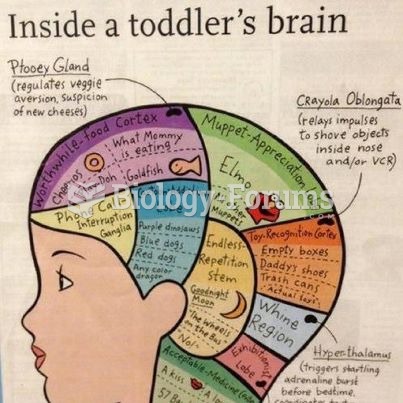Answer to Question 1
1, 2, 3, 4
Explanation:
1. A time-out is an appropriate intervention for the nurse to suggest when a toddler-age child is exhibiting behaviors that include other people, such as biting.
2. Separation of the child from the situation is an appropriate intervention for the nurse to suggest when a toddler-age child is exhibiting behaviors that include other people, such as biting.
3. It is appropriate to encourage the parents to tell the child that the behavior is unacceptable when the child is exhibiting behaviors that include other people, such as biting.
4. When a child is exhibiting behaviors that include other people, such as biting, it is appropriate to assess the amount of sleep the child is getting each night. Lack of sleep is a common cause for behaviors such as biting.
5. Distraction is appropriate for undesirable behaviors exhibited by the child; however this is not an appropriate when the child is exhibiting behaviors that include other people, such as biting.
Answer to Question 2
1, 2, 3, 4
Explanation:
1. When conducing a mental health assessment for a toddler-age child it is appropriate for the nurse to observe the child's interaction with family members.
2. When conducting a mental health assessment for a toddler-age child it is appropriate for the nurse to ask the caregiver to describe the child's typical day.
3. When conducting a mental health assessment for a toddler-age child it is appropriate to determine whether the child is mastering age-appropriate skills, such as the use of a crayon for a toddler-age child.
4. When conducting a mental health assessment for a toddler-age child it is appropriate to inquire about the number of hours of sleep the child gets each night.
5. The nurse assesses exposure to communicable diseases during a typical health maintenance visit; however, this action is not appropriate when assessing the toddler's mental health.







